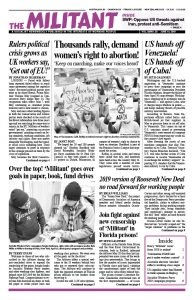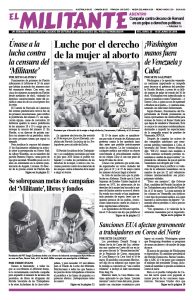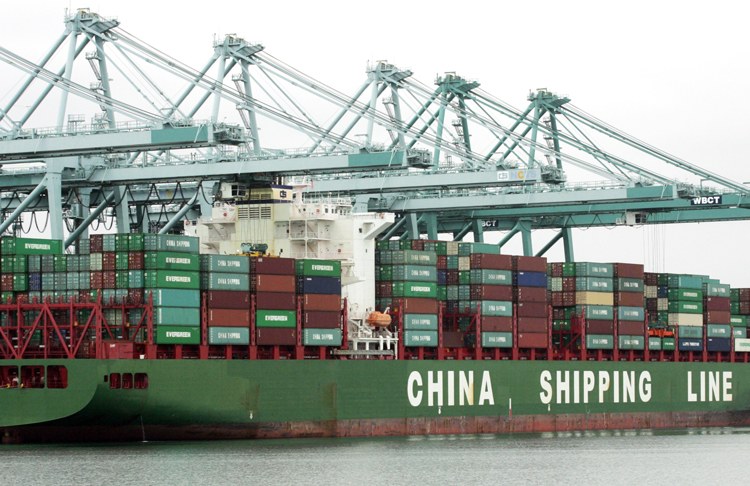On May 15 Washington escalated its attack on Chinese telecom giant Huawei, taking steps to cut the company off from suppliers and ban it from doing business in the U.S.
President Donald Trump that day signed an executive order enabling the government to bar telecommunications gear and service from “foreign adversaries.” It argued that the company — the biggest supplier of such equipment worldwide — is really a creature of the Chinese government and could be used for surveillance and other mayhem.
The rapidly growing company is the second largest worldwide in smartphone sales, ahead of Apple and just behind a slipping Samsung.
This was the latest move by Washington to press the Chinese rulers to agree to a new trade deal more responsive to the U.S. capitalist rulers’ interests. Trump called Huawei “very dangerous,” but then turned around and said, “It’s possible that Huawei would be included in a trade deal.”
Washington’s move against the company had immediate effects. Carriers in Japan, Taiwan, Germany and the U.K. stopped taking orders for Huawei smartphones May 22 and shelved plans to offer the Chinese company’s hotly anticipated “5G” phones.
Server producers Quanta and Wistron, based in Taiwan, are moving production out of China, to avoid loss of business with U.S.-based Google and Facebook. Google announced this week it would stop selling its Android operating system to Huawei.
The U.S. rulers are trying to protect their declining world dominance against the rising economic and military power of Beijing. For now Washington is the most powerful, and it’s fighting for a deal that registers this current relationship of forces.
Earlier in May trade talks between the world’s largest and second largest capitalist economies broke down after months of seeming progress. On May 5, the Trump administration raised punitive tariff rates from 10% to 25% on $200 billion worth of imports from China, threatening to do the same on a further $300 billion. Beijing retaliated a few days later with similar duties on $60 billion of imports from the U.S.
Washington complains that as well as Huawei’s threat to national security, the company and its Chinese government enabler have cheated, stolen trade secrets and “back engineered” their U.S. competitors’ products to get ahead.
These charges were in a May 25 Wall Street Journal article, “Huawei’s Yearslong Rise is Littered with Accusations of Theft and Dubious Ethics.”
No doubt at least some of the charges are real, but this is just the normal workings of dog-eat-dog capitalist morality. U.S. bosses have used these same methods against their rivals — and much worse, including bloody wars — to become the top imperialist exploiter.
As China’s capitalist economy has expanded, workers have fought and won higher wages. This has led to a shift of export manufacturing from China to countries where workers’ pay is lower, especially in Southeast Asia, a trend accelerated by the trade tensions and new tariffs between Washington and Beijing. Manufacturing for the U.S. market from Vietnam in particular has increased.
Recently Beijing, the largest foreign holder of U.S. Treasury debt, tested selling some of its $1.2 trillion of U.S. government bonds accumulated from years of trade surpluses. However, a larger selloff to pressure Washington would be financially destabilizing, not only for the U.S. economy but also for China.
The White House insists they still hope to reach an acceptable — meaning pro-U.S. bosses — agreement with Beijing. The Chinese rulers say they will only sign an agreement that safeguards their “national dignity.”
China’s rulers take the long view. An opinion piece in China Daily May 24 noted that “China already knows what it’s like to suffer under the yoke of a colonial master. No matter what the U.S. or anyone else tries, it won’t do so again.”
Like all advancing capitalist powers, Beijing’s rise today is based on large-scale exploitation of labor. No one knows this better than Han Dongfang, a railroad worker and leader of the workers’ encampment in the Tiananmen uprising 30 years ago, later imprisoned for his role there. Today he edits the Hong Kong-based China Labour Bulletin. “It is ironic that people are waving the communist flag,” he told the Financial Times, “but in fact the party is the biggest believer in capitalism, in the market and in jungle rule in the world.”
A meeting is planned between Trump and Chinese President Xi Jinping at the G-20 summit in Japan June 28-29.


